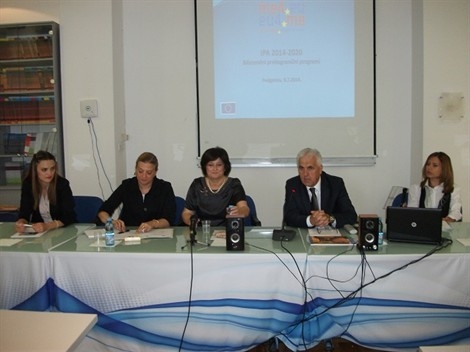Union of Municipalities of Montenegro and Ministry of Foreign Affairs and European Integration hosted earlier today, in cooperation with the Human Resources Management Authority, a presentation of programme documents for bilateral, trilateral, and trans-national programmes which will be financed within the IPA II 2014-2020 programming period. The event also gathered representatives of local self-governments.
The aim of the meeting was to inform representatives of local self-governments about programme objectives, thematic priorities, and planned activities. They were invited to give proposals and suggestions related to local self-government work and their more active involvement in the cooperation programme.
Participants were greeted by Human Resources Management Authority Director Svetlana Vuković, who underscored the excellent cooperation her institution has had with the Union of Municipalities of Montenegro through a number of trainings intended to improve the capacities of local self-governments towards better provision of services. She emphasised that the new labour concepts command adoption of new skills and that European funds are important precisely for these objectives.
In his introductory speech, Union of Municipalities Secretary General Refik Bojadžić noted that European funds are an important source of financing for Montenegrin municipalities and added that Montenegrin municipalities implemented a great number of projects within the 2007-2013 programming period. In addition to the experience in implementing bilateral and trans-national cooperation projects financed by the EU, we put an emphasis on the exchange of experience between countries, which is of great importance for innovation and improvement of municipality services based on lessons learned and best practices of others, which ensures better results with less investment, Mr Bojadžić has said.
Director General for the coordination of EU assistance programmes Ivana Petričević underlined the importance of strengthening local self-government capacities in the EU accession process, in order for them to be prepared to use the structural funds when Montenegro becomes a member. She reiterated that Montenegro will participate in 9 cross-border and transnational programmes within the 2014-2020 financial perspective: 4 bilateral (Montenegro-Albania, Montenegro-Kosovo*, Serbia-Montenegro, and Bosnia and Herzegovina-Montenegro), 2 trilateral (Croatia-Bosnia and Herzegovina-Montenegro, and Italy-Montenegro-Albania) and 3 trans-national programmes (Danube, Mediterranean, and Adriatic-Ionian). She was hopeful that the local self-governments will achieve even better results in implementing cross-border cooperation projects in the future and that this will contribute to an improved socio-economic standard of citizens.
Director for cross-border cooperation programmes Ivana Glišević Đurović presented the programming process and the thematic priorities of bilateral and trilateral programmes, which have been made in accordance with relevant EU strategies, partner countries’ priorities, and experience acquired in the said programmes. The thematic priorities shared by all bilateral programmes are: promotion of tourism, cultural, and natural heritage; environmental protection; boosting employment, labour mobility, and social inclusion. She stressed that online consultations for bilateral programmes are open until 18 July and noted that after this date all suggestions and comments of the parties involved will be forwarded to the European Commission for analysis.
Head of Office for Coordination and Horizontal Issues Tijana Ljiljanić presented thematic priorities and objectives of the Danube, Mediterranean, and Adriatic-Ionian Programme. She underlined that the trans-national programmes are intended to contribute to a long-term development of the regions involved, as well as to a closer trans-national economic and cultural cooperation. She presented, through three financial perspectives, the experiences and expectations related to the implementation of the transnational programmes in which Montenegro is participating.
For the duration of online consultations on the draft operational programmes, all local self-governments are invited to submit by 15 July their comments to the Union of Municipalities, who will then send them in a consolidated form to the Ministry of Foreign Affairs and European Integration.


